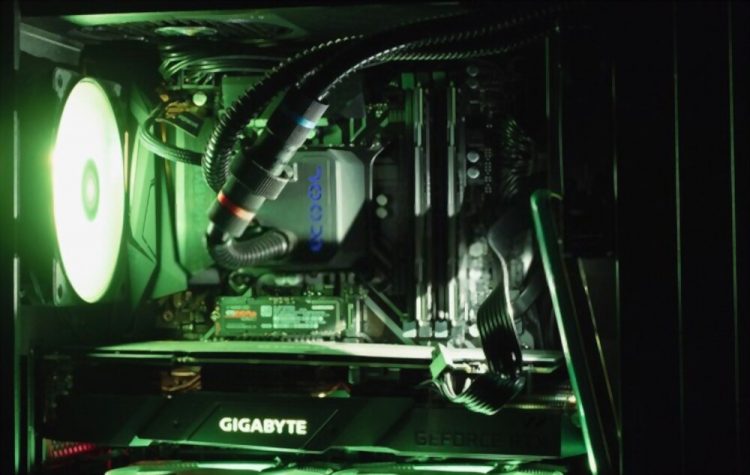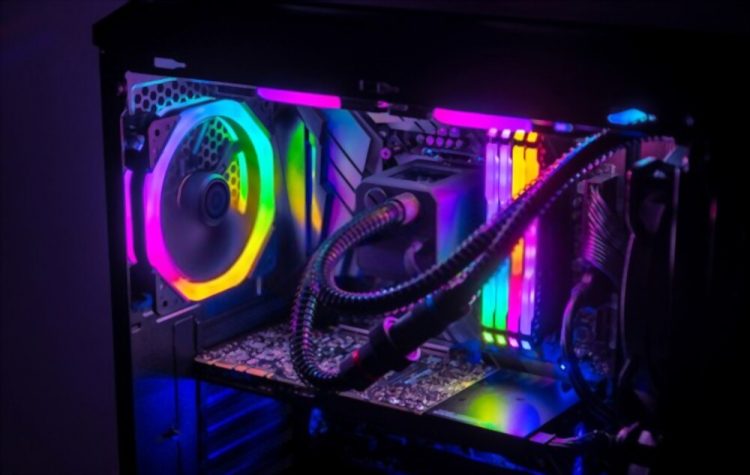When you are building a gaming PC from scratch, it is important to know about the parts that really matter to build an ideal gaming rig. You always have to make sure that the hardware you choose for your gaming PC is reliable and future-proof. So, this informational guide is all about that, picking the most important hardware for your gaming PC while staying under your budget range.
Things to Consider Before Building a Gaming PC
Before you go out and make a purchase, it is important to know some essential factors.
Your Budget & Needs
Before you buy any parts for your gaming PC, it is important to set a specific budget in mind. The prices of PC gaming peripherals keep changing every week or month. Especially, the graphics cards are now priced double their original price.
We divide gaming PCs into entry-level, mid-level, and high-end. An entry-level gaming PC will cost you around $600, mid-level will go up to $1200, and high-end gaming PCs cost over $1200. So, keeping these figures in mind, you should choose your gaming peripherals.
What Components Do You Need to Build a Gaming PC
To build a gaming PC on any budget, you will need the most compatible components and some handy tools. Components like CPU, Motherboard, Ram, Graphics Card, Ram, Storage, and Power Supply play a huge role in the performance of your gaming PC.
CPU (Processor)
If you want lag-free gaming performance, you have to install the best gaming processor on your gaming PC. CPU is the second-most important part of a gaming PC after graphics card.
The most important parts to consider in a gaming CPU are the cores, threads, and clock speed. Modern CPUs from Intel and AMD are equipped with higher clock speeds and cores. And if you really need an ideal performance in gaming, you have to opt for the latest-gen CPUs.
CPUs from Intel are best known for their unbeatable gaming performance. Intel CPUs are good at single-core performance and most PC games still depend on the single-core performance of a CPU. But at the same time, Intel CPUs are expensive as compared to their AMD variants.
AMD processors are good at multi-core performance while staying on budget. And if you are into streaming and gaming at the same time, you should go for AMD.
Motherboard
Now as you know which CPU is right for your gaming PC, it’s time to look for the right motherboard. Motherboards come in various form factors and features.
If you are building an entry-level gaming PC, then you should avoid expensive motherboards that come with extra features like overclocking, thunderbolt transfer ports, multiple PCI Express slots, etc.
For Intel’s Kaby Lake processors, you will need a Z-Series motherboard Whereas, for the AMD processors, a B- or X-Series motherboard will do the job.
Once you’ve decided on the CPU and type of motherboard, it’s time to look for the size of your motherboard. The most common sizes of gaming motherboards are
- ATX (The biggest size)
- M-ATX
- ITX (The smallest size)
We highly recommend going with an ATX motherboard that is cheaper as compared to ITX motherboards. Also, an ATX motherboard gives you more space for upgrading your gaming PC. ITX mobos are expensive with a limited number of ram and expansion slots.
So going for ATX or Micro-ATX motherboards will save you a few bucks while keeping your gaming PC future-proof. Keep in mind that the motherboard is the foundation that decided what type of hardware you can install on your computer, you should not entirely depend upon the motherboard for gaming.
Graphics Card (GPU)
A GPU is the most expensive part of a gaming PC. Things that affect the performance of a GPU are the clock speed, VRam, and memory Interface. And when it comes to buying a GPU for a gaming PC, there are just two options, Nvidia or AMD.
Clock speed plays a huge role in rendering the images and effects while gaming. Nvidia is right now shining in the GPU market with more clock speed but on a higher price tag.
Another metric that determines the performance of a GPU is the VRAM. Low-budget GPUs are using the GDDR5 interface whereas modern cards make use of the latest GDDR6 memory type.
How much video ram you should have depends upon your gaming needs.
- 4GB VRam is good for 1080p gaming experience
- 6GB VRam is ideal for1440p gameplay
- 8GB+ VRam is best for 4K gameplay
Keep in mind that that the more VRAM and clock speed a GPU has, the higher would be its price. So you have to find a sweet spot between price and performance when looking for a gaming GPU. Right now, a 6GB graphics card with a GDDR6 memory interface would be the best option in terms of budget and performance.
Ram
Choosing the right amount of ram will significantly improve the performance of your gaming PC. Keep in mind what we’ve said “Right amount of ram”. So if you have more amount of ram than needed, you are wasting your money.
Ram sticks are available in different amounts and types. DDR4 is the fastest memory module available right now in the market. Again clock speed and amount of ram installed in your PC somewhat impact your gaming performance. Unless you are building an expensive high-end gaming PC, there is no need to take into account the clock speed of a ram.
When it comes to the amount of ram needed in building a gaming PC, here’s what we believe and recommend:
- 4GB is good for entry-level gaming PCs
- 8GB is the sweet spot for a mid-level gaming PC. Also, find out if it’s worth upgrading from 4 to 8GB ram.
- 16GB is the an ideal amount of ram for a high-end gaming PC. Anything over 16GB would be overkill for a gaming PC.
Storage
Although the type of storage device that you choose has little to no impact on your gaming PC, we still recommend you go with an SSD. It is because SSDs are faster and durable as compared to hard drives. Hard drives do offer more space for a less price but there are more chances of their failures. NVMe SSDs are faster and cheaper as compared to older SSDs.
Keeping in mind the installation requirement of modern AAA game titles, we recommend you to go for an SSD with 1TB of storage capacity.
Power Supply Unit (PSU)
Choose your PSU depending on the type of gaming PC that you intend to build. For an entry-level gaming PC, a low-budget gaming power supply would be good enough to power all the components of your PC. Always go for a reliable and trusted PSU manufacturer, this will eliminate any chances of damage to your hardware.
Next, you can head on to Google and search for the “power supply calculator” to ensure you how much power your gaming PC will consume. Also, make sure you choose a PSU with an 80+ efficiency rating.
The better the efficiency rating a PSU has, the more power it will utilize. Low-budget PSUs often come with 80+ Bronze efficiency while the expensive ones come with an 80+ Gold efficiency rating.
More wattage and higher efficiency ratings determine the overall cost of a power supply. Below are some of the PSU wattage recommendations as per our experience:
- 450W is good for an entry-level gaming PC
- 650W is best for mid-level gaming PC
- 850W and over is ideal for a high-end gaming PC
PC Case
A stylish and durable gaming PC case really adds a cool look to your gaming setup. But you should choose a PC keeping in mind your other gaming peripherals.
Just like the motherboard, PC cases are available in different form factors like ATX, Micro-ATX, and Mini-ITX. The size of a PC case that you choose will decide the size of other important gaming components to be installed inside a case.
If you are going after a bulky GPU, then you must consider an ATX or Micro-ATX case. Also, choosing an ATX or M-ATX case will allow you to upgrade your gaming PC with more peripherals. Especially, if you are installing aftermarket CPU coolers, you need to have a spacious PC case.
If you really don’t like taller ATX cases, you can go after a mid-tower PC case. These days, mid-tower PC cases are on the trendy side of the story and cost less as compared to ATX cases. Also, for entry and mid-level gaming PCs, a mid-tower PC case would be an ideal fit.
Additional Parts That Matter in a Gaming PC
Above were some of the most important parts of a gaming PC. Now, we will discuss some additional components that you can install if your budget allows you to go for them. And these are the parts that really matter if you are building a high-end gaming PC.
CPU Coolers
Aftermarket CPU coolers play a great role if you are interested in overclocking your CPU. Third-party CPU coolers are more efficient in heat dissipation as compared to stock coolers. CPU coolers have two different types, the air CPU cooler and the liquid CPU cooler.
Air coolers are cheaper as compared to liquid coolers. However, liquid coolers are the best option to go with if you want to achieve higher clock speeds. Liquid coolers use water as the main thermal conductor for dissipating the heat of a CPU.
Air and liquid CPU coolers also come with RGB lighting effects to enhance the aesthetics of your gaming PC. The colors of RGB CPU coolers can also be customized with the help of built-in software to match your current gaming rig.
Keyboard and Mouse
Well, the keyboard and mouse have almost no impact on your gaming performance, but they surely add a stunning look to your gaming setup. However, for a gaming setup, we prefer a TKL (Ten Key Less) keyboard and a branded gaming mouse. Nowadays, RGB mice are cheaper and are equipped with the most-needed gaming features.



